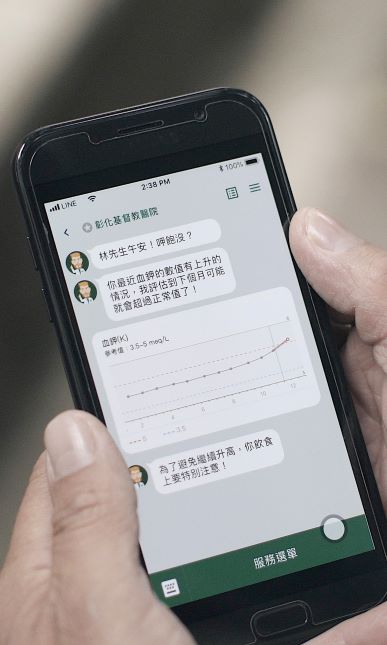Taiwan Computing Cloud quickens deep learning and brings personalized medical care to fruition
The DeepQ, a medical care business of HTC, and Changhua Christian Hospital launched Dr. Lan, a talking medical care robot, in early 2019. To strengthen Dr. Lan's capabilities to serve, the National Center for High-performance Computing (NCHC) joined DeepQ and Changhua Christian Hospital and used TWCC to provide computational speeds that were close to seven times as fast as the original speeds to help DeepQ more quickly develop its deep-learning skills, help Dr. Lan upgrade, and establish a comprehensive medical care network that will bring the AI medical care of Dr. Lan to every patient at the hospital. The care of physicians can be transmitted to patients through conversations on cellphones. Precision, personalized medical care can be realized for patients to show them the unique touch of TLC (Tender, Loving, Care) that the hospital is always extending to them that makes them feel that the hospital treats them like family.
TWCC High performance computing acomplishes medical care AlphaGo
The core technology of AI medical care is the strengthened deep-learning AI, a result of training afforded by a supercomputer, which is akin to an AlphaGo in medical care field, can quickly find the best solution from among numerous possibilities. In Go, there are 361 possibilities for where the next piece can be placed, but in Dr. Lan—the talking medical care robot of DeepQ and Changhua Christian Hospital—there are more than 800 possible choices for the next action, taking into consideration of symptoms, medical tests, and diseases. It has been a great challenge to train AI under such a highly-complicated situation.
Fortunately, TWCC can provide computational speeds that are nearly seven times faster than DeepQ to help training. Each training session demands more than 10 exa floating-point operations. Unceasingly exploring and learning through AI to accumulate experience makes AI more intelligent and more precise. It used to take a week to complete a large-scale training, but with the help of TWCC, the same task now takes just one day, and the algorithm is improved as well.
Furthermore, Dr. Lan highly values user experience. Through AI, we hope to gradually improve Dr. Lan's functionality. For example, Dr. Lan is designed for caretakers at home. When multiple members of a family come to the hospital to see their respective doctor, Dr. Lan will check, one by one, their progress at their clinics. This will help caretakers—such as sons or daughters who accompany their parents to the clinic or parents who take their children to be examined—more easily arrange their schedule and make their hospital visits more efficient. This also optimizes the AI interactions of Dr. Lan when it provides clinic-visit guidance. When patients don't feel well, Dr. Lan can help find their symptoms based on either the choices they have made on a diagram of a human body or their written words of symptom description. It is not just more intuitive but also more informative.
In medical care through AI, one can use interactive conversations to kick start a chain of care. From AI clinic-visit guidance to recording of questions and answers before being seen by the doctor, Dr. Lan not only helps patients make medical appointments with precision but also tracks one's personalized test analyses, provides medication reminder, even monitors patients’ chronic diseases. This is all-day individualized medical care which improves the quality of medical care, and also helps build and improve patient-physician relationships. In the future, Dr. Lan will continue to learn and to be upgraded so that it can become a dedicated personal medical caretaker that knows the patients better and better over time.

The talking medical care robot, Dr. Lan, will give reminder if the health indices change.
AI computations happen on the cloud, but humane care unfolds around the patient
According to Xu Tian-cheng, Changhua Christian Hospital IT director, his hospital has strived to operate in an AI-as-a-service (AaaS) model in which AI will analyze cases to help physicians make clinical diagnoses. AI can even monitor patients around the clock. When AI predicts an abnormal event, it can warn physicians. This allows physicians to focus their energy on matters that more urgently need their attention, thus improving patient's health, safety, and quality of medical care.
Sam Yu, the DeepQ Special Projects senior director, pointed out that DeepQ has aimed to gradually achieve precision medicine. It will apply advanced technologies to health care and clinical applications. To help improve medical service, DeepQ has deep learning AI at its core and has been designed to focus on patient experience. Not only assisting physicians to make more accurate judgments, but also DeepQ provides patients with more effective and passionate care, leading to improved patient and caregiver relationships.
According to NCHC Director General Shepherd Shi, whenever there are good applications, TWCC can be the best helper in any highly professional field. Take medical care for example, AI image recognition applications can help reduce the amount of time that physicians need to read medical images. Deep learning AI can effectively learn superior dialogue strategies in complicated scenarios and provide rapid and precise service. He believed that TWCC would be used in more medical applications and that TWCC would help transform the medical care industry in Taiwan toward smart medicine.
 國家高速網路與計算中心
國家高速網路與計算中心
